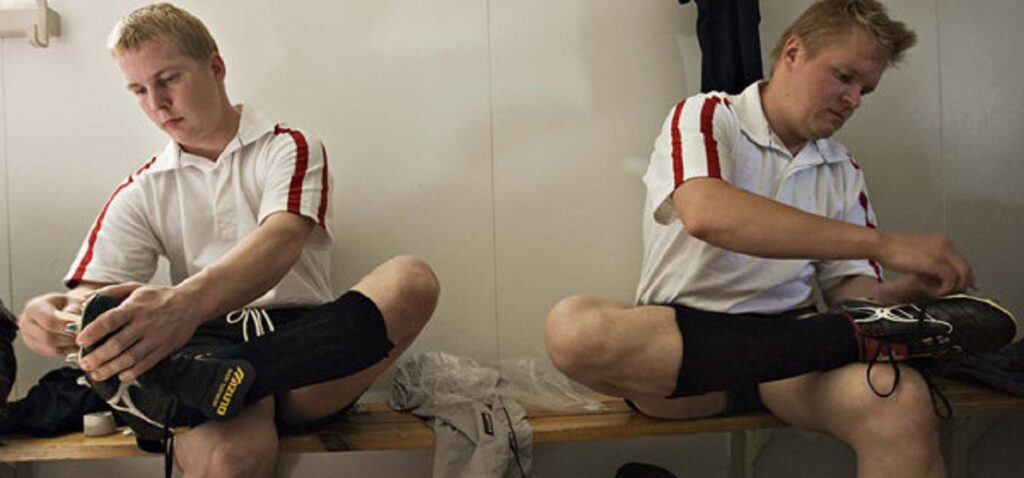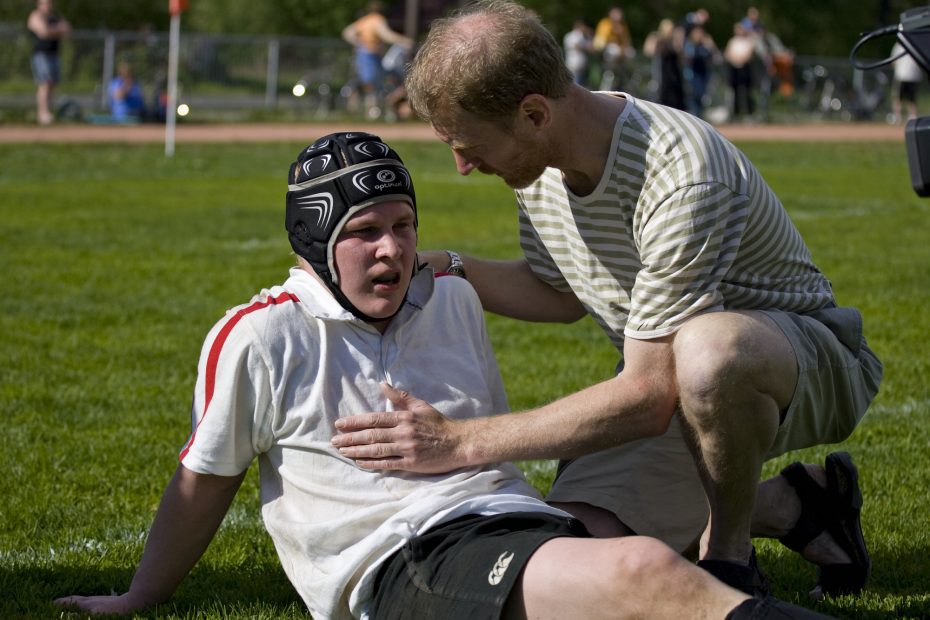Freetime Machos
A hilarious and heartfelt look at rugby, friendship, and Finnish masculinity.

Freetime Machos began as an unconventional idea: a “documentary comedy” about the world’s most northern – and third worst – rugby team. Director Mika Ronkainen, already known for offbeat documentaries like Screaming Men (about a shouting male choir), was drawn to the subject as a way to explore Finnish men and friendship with humor. The film was produced by Ronkainen’s own company (Klaffi Productions) with co-producers in Germany and support from the Nordisk Film & TV Fund. Filming took place over the 2007 rugby season in Oulu, Finland, as Ronkainen embedded with the amateur team OYUS Rugby.

123movies elevates the movie-watching experience by bringing together the most anticipated premieres, rare indie films, and legendary TV shows in one place. The platform impresses with its rapid content updates, adaptive player for smartphones, tablets, and Smart TVs, and smart recommendations tailored to your preferences. Users enjoy no hidden fees, the ability to download content for offline viewing, and built-in tools to rate films. With 123movie, cinema transcends mere entertainment, becoming a lifestyle where technology and creativity merge perfectly for fans of visual storytelling.
The director’s vision was to capture real Finnish “macho” men in their element – and then peel back that macho façade. “When gentle men try to be tough, it can be funny. But where there is comedy, tragedy is not far,” Ronkainen observed, summarizing the film’s tonal balancing act. Despite its comedic pitch, the production faced challenges blending tones. In editing, Ronkainen found the story’s heart in the genuine friendship between two players, even if that meant toning down some comedic exaggeration.
Ultimately, Freetime Machos premiered in the feature competition at IDFA (International Documentary Film Festival Amsterdam) in November 2009, a prestigious slot for a Finnish film, and rolled out in Finland in March 2010 on a modest four-screen release. Distributed internationally by DR Sales, the documentary reached festivals from Tribeca in New York to Docville in Belgium, carrying Ronkainen’s unique blend of raw honesty and dry humor to global audiences.
Expanded Plot and Character Analysis
On the surface, Freetime Machos is about a downtrodden rugby team trying desperately to win at least one game in their season. But as many reviewers noted, the film “is not about rugby, but the need to reclaim one’s confidence and respectability in the face of emasculation.”
The narrative follows best friends Matti and Mikko, two regular guys on Finland’s worst amateur rugby squad. Overworked and domesticated in their daily lives, they use rugby as an outlet to “revel in their masculinity and bond with other men.” Matti, in his twenties and single, looks forward to boozy post-game revelry and the freedom of the pitch. Mikko, older and married with four children, struggles to balance home duties with rugby – often arriving late to practice or missing it altogether due to family obligations.
This mismatch creates a gentle tension between the friends: as Mikko’s wife becomes pregnant and he must pick up more parenting responsibilities, Matti feels a bit abandoned, longing for the “drunken rugby summer” his buddy had promised. Their dynamic is both comedic and touching. One critic likened them to a “Dumb and Dumber” duo with “palpable homoerotic tension, which Ronkainen exploits admirably as deadpan humour.”
Indeed, much of the film’s humor comes from poking at traditional macho posturing – the team’s inflatable sex-doll mascot Barbara and their unorthodox pre-game cheer of “Oh, shiiiiit!” set a goofy tone even as the men fiercely tackle each other on the field.
Beyond the central friends, we meet other personalities: Roger, the team’s British coach, stands out as a figure of earnest determination. A professional who moved to Oulu for a Nokia engineering job, Roger pours his heart into coaching this hapless squad. His “Sisyphean task of winning ballgames” earns both laughs and sympathy; when budget cuts threaten his day job at Nokia, it underlines a deeper theme of modern male insecurity.
Another teammate, Jarmo, is an aspiring writer using the team as inspiration – he’s working on a novel exposing workplace struggles after being laid off by Nokia. Through these individuals, Freetime Machos explores what motivates Finnish men beyond the field. There’s a running commentary (delivered in voiceover monologues and pub conversations) about the stoic nature of northern Finnish males – how they “would rather be stabbed in the back than complain about woman trouble or say hello to an unknown neighbor.”
This absurdly exaggerated machismo sets up the film’s central irony: despite the rough rugby rucks and macho banter, these men reveal themselves to be quite sensitive and supportive. They cook, they clean, they care for kids; one early scene shows the “tough” guys instantly dropping the act when a minor injury occurs, fussing over their teammate rather than telling him to man up.
In the end, the quest for a single victory on the rugby pitch becomes a hilariously underdog backdrop for a heartfelt story about friendship. The narrative arc keeps us rooting for Matti and Mikko’s bond as much as for the team’s scoreline. Ronkainen crafts the film as a “genuine and disarmingly funny love story of modern male friendship,” using the season’s progress (and mounting losses) to engage the audience with plenty of laughs and a surprising amount of soul.

Cinematography and Technical Aspects
Visually, Freetime Machos adopts a straightforward, observational documentary style that matches its authentic subject matter. Cinematographer Vesa Taipaleenmäki often lets the camera simply observe the team in their element – whether huddled in a muddy scrum or sweating in the sauna – without flashy tricks. This creates a feeling of intimacy and realism, as if we’re just “one of the guys” hanging out.
The director’s approach is described as “casual, breezy” in tone, and that extends to the visual storytelling. Many scenes are shot in a cinéma vérité fashion, with handheld footage of locker-room banter and on-field action that put us right in the scrappy midst of things. Yet Ronkainen also knows when to hold a shot for comedic effect – for example, a slow pan across the utterly exhausted players sprawled in the dressing room, with the lifeless inflatable Barbara doll among them, silently captures the ridiculous pathos of this team’s efforts.
The editing by Anders Villadsen stitches together sports, home life, and pub camaraderie into a tight 86-minute narrative. Initially, the film “searches for its form” and jumps between threads, but it finds its rhythm once the focus centers on Matti and Mikko’s friendship.
Critical Reception and Box Office Performance
Upon its release, Freetime Machos elicited a range of responses in Finland and abroad. Finnish critics were polarized – some adored the film’s humor and insight, while others were less impressed.
Internationally, the film fared better with critics who appreciated its quirky charm. At the Tribeca Film Festival in New York, Freetime Machos delighted audiences; it was praised as “bewitching and weirdly offbeat,” a “sharply observed film” with a “dry, slightly absurdist take on manliness.”
In terms of box office, Freetime Machos had a limited theatrical run domestically. Opening on four screens in Finland, it sold a modest number of tickets – as expected for a niche documentary. The real impact of Freetime Machos has been in its afterlife. It found an audience through festival screenings and later television/streaming; at one point it was made available on Netflix in Finland, extending its reach to viewers who might relate to its comedic take on the “bromance” of everyday guys.
Overall, Freetime Machos stands as an engaging and insightful film that marries bruising rugby antics with a tender study of men at a crossroads. In the words of one festival reviewer, it’s “a genuine and disarmingly funny love story of modern male friendship” – one that leaves you grinning, win or lose. It’s fair to say Mika Ronkainen scored a try with this documentary, using sports as the scrum to examine the souls of these free-time machos.
